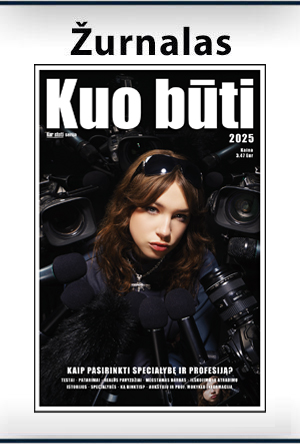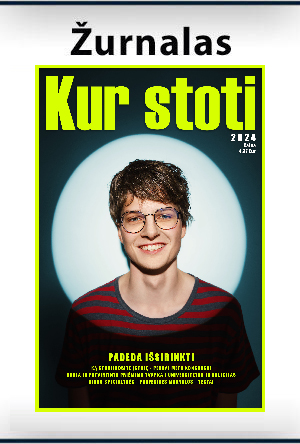Klausimai apie LKKA
Rimante2011 04 16 • 78.62.125.58 cituoti
sveiki.noreciau suzinoti ar istociau i vf kineziterapija jei islaikiau valstybinius ezgaminus lietviu,anglu ir istorija? aciu
noreciau istoti2011 05 01 • 86.100.89.152 cituoti
Sveiki, noreciau paklausti. esu 10-oje klaseje. pasirinkau siuos dalykus: Matematika A, Biologija A, Chemija B, Lietuviu A. kokios specialybes man tiktu pasirinkus siuos dalykus?
Ineta S.2011 05 05 cituoti
Laba. ar reiketu laikyti motyvacini testa (ar ka panasaus) stojant i sportine rekreacija ir turizma?
jevgenij2011 05 19 • 88.216.16.38 cituoti
islaikes matematikos ir biologijos valstybinius egzaminus ir lietuviu mokiklini kokie sansai istot i Turizmo ir sporto vadyba? Kokiu egzaminu reikia? Ir kiek trunka neakivaizdinis mokimasis?
muay-thai2011 05 19 cituoti
Jeigu as islaikes biologija ir matimatika valstybinius o lietuviu mokiklini kokie sansai istot i Turizmo ir sporto vadyba? Kokiu egzaminu aplamai reikia? Kiek laiko trunka neakivaizdinis mokymasis? Ir ar galimas nuotolinis mokymasis, pavizdziui jeigu as gyvenu uzsienyje?
muay-thai2011 05 19 cituoti
Jeigu as islaikes 2 valstibinius biologija ir matematika, ir lietuviu mokiklini kokie sansai man istoti i Turizmo ir sporto vadyba jeigu mano istojamasis balas 8. Ir kas jeigu as 12kl neturejau istorijos.
muay-thai2011 05 19 cituoti
Jeigu as islaikes 2 valstibinius biologija ir matematika, ir lietuviu mokiklini kokie sansai man istoti i Turizmo ir sporto vadyba jeigu mano istojamasis balas 8. Ir kas jeigu as 12kl neturejau istorijos.
Kazys2011 06 01 • 78.63.150.12 cituoti
Žmonės,man verkti norisi pažiūrėjus į jūsų užduodamus kvailus klausimus...
Norėjau paklausti, ar vis dar yra stojamieji egzaminai ar fizinio pasirengimo testai stojant į Treniravimo sistemas?
Norėjau paklausti, ar vis dar yra stojamieji egzaminai ar fizinio pasirengimo testai stojant į Treniravimo sistemas?
Karr2011 06 05 • 88.222.189.28 cituoti
Sveiki, norėčiau paklausti jeigu išsilaikau biologija, lietuviu, istorija, valstybinius egzaminus, kokia galimybė istoti pas jumis? Ir kokios specialybės butu? Jeigu nelaikau nei vienos užsienio kalbos tik mokausi A lygiu, ir dar + Chemija A lygiu.
Agnė 2011 06 08 • 78.60.251.132 cituoti
Sveiki, norėčiau paklausti kur galima dirbti, baigus Sportinę rekreaciją ir turizmą studijas?
Lina2011 06 14 • 78.57.142.241 cituoti
Laba diena! Esu dvyliktoke ir esu labai pasimetusi nezinau ka studijuoti? gal galetumet patarti ka galima studijuoti su lietuviu kalbos, istorijos, anglu kalbos ir geografijos egzaminu? is anksto Aciu uz atsakyma
Miixas2011 06 21 cituoti
[b]Kokias man reik pasirinkt 11-12kl pamokas, kad galėčiau eit i treniravimo sistemos arba kuno kultura ?p/b]
Jst2011 06 29 • 88.222.100.228 cituoti
Biologija, Anglu, Lietuviu(egzai)+ Matematikos arba Kuno kulturos (metinis) seip ismokit google naudotis viskas yra lkka.lt :)
zymuke2011 07 26 cituoti
Sveiki,
Norėjau paklausti dėl mokesčio už pirmąjį semestrą įstojus į sportinę rekreaciją ir turizmą, tai kokia sumą pinigų reikia pervesti???
Ačiū už atsakymą.
Norėjau paklausti dėl mokesčio už pirmąjį semestrą įstojus į sportinę rekreaciją ir turizmą, tai kokia sumą pinigų reikia pervesti???
Ačiū už atsakymą.
Dei2011 07 27 • 78.58.26.30 cituoti
Ten pat įstojau :) Buvau šnd dokų tvarkyt ,tai reikėjo 2000 pervest :>
Mantelis44412011 07 31 cituoti
Sveiki, gal būt kas nors iš LKKA galėtų plačiau papasakoti apie kūno kultūros studijas čia http://www.sportoforumas.lt/viewtopic.php?f=42&t=13 (pirma reikia užsiregistruoti, tai užtruks 1min.) Tai puiki galimybė populiarinti LKKA ir jos studijas
mokinys2011 08 09 • 46.36.75.82 cituoti
Sveiki. Ar yra galimybė įstoti į LKKA magistrantūros studijas baigus KTU sporto inžineriją?
mokinys2011 08 09 • 46.36.75.82 cituoti
Konkrečiau - į treniravimo sistemų programą.
MitChooni2011 08 09 cituoti
William Turner was an English naturalist, botanist, and theologian who studied at Cambridge University to eventually became known as the “father of English botany” achieving botanical notoriety through his 1538 publication Libellus de re Herbaria Novus, which was the first essay on scientific botany in English. <a href=http://chauhung.edu.vn/forum/memberlist.php?mode=viewprofile&u=8427>herbalist</a> His three-part A New Herball of 1551–1562–1568, with woodcut illustrations taken from Fuchs, was noted for its original contributions and extensive medicinal content and for being more accessible by being written in vernacular English. Turner described over 200 species native to England and his work had a strong influence on later eminent botanists such as John Ray and Jean Bauhin. <a href=http://www.forum.nayanova.edu/memberlist.php?mode=viewprofile&u=1762>herbal colon cleanse</a> John Gerard is the most famous of all the English herbalists. His Herball of 1597 is, like most herbals, largely derivative. <a href=http://hcc-webhead.hagerstowncc.edu/%7Egaknibb/phpbb/memberlist.php?mode=viewprofile&u=19111>herbal essences</a> It appears to be a reformulation of Hieronymus Bock's Kreuterbuch subsequently translated into Dutch as Pemptades by Rembert Dodoens, and thence into English by Carolus Clusius, then re-worked by Henry Lyte in 1578 as A Nievve Herball. This became the basis of Gerard's Herball or General Hiftorie of Plantes.
MitChooni2011 08 10 cituoti
The medicinal component of herbals has developed in several ways. <a href=http://www.ilpkangar.gov.my/forum/memberlist.php?mode=viewprofile&u=1013>herbalist</a> Firstly, discussion of plant lore was reduced and with the increased medical content there emerged the official pharmacopoeia. The first British Pharmacopoeia was published in the English language in 1864, but gave such general dissatisfaction both to the medical profession and to chemists and druggists that the General Medical Council brought out a new and amended edition in 1867. <a href=http://www.facss.us/orgs/facss/bbs/memberlist.php?mode=viewprofile&u=1589>herbal colon cleanse</a> Secondly, at a more popular level, there are the books on culinary herbs and herb gardens, medicinal and useful plants. Finally, the enduring desire for simple medicinal information on specific plants has resulted in contemporary herbals that echo the herbals of the past, an example being Maud Grieve's A Modern Herbal, first published in 1931 but with many subsequent editions. <a href=http://kienan.edu.vn/forum/index.php?action=profile;u=77092>herbal essences</a> Illustration of Delphinium peregrinum in Flora Graeca by John Sibthorp and Ferdinand Bauer. The magical and mystical side of the herbal also lives on.



